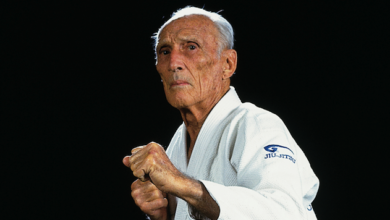Ip Man: The Grandmaster of Wing Chun

Experts: Ip Man (葉問), also spelled Yip Man, was born on October 1, 1893, in Foshan, Guangdong, China. He belonged to a wealthy family and received a privileged education. From an early age, he was introduced to Wing Chun, a Chinese martial art specializing in close-range combat, efficiency, and fluidity of motion.
At the age of 9, he began learning Wing Chun under Chan Wah-shun, a highly respected master of the art. However, after his master passed away, Ip Man continued his training under Ng Chung-sok, a senior disciple of Chan Wah-shun. Later, as a teenager, he moved to Hong Kong, where he further refined his Wing Chun skills under Leung Bik, the son of Leung Jan, a legendary Wing Chun master.
Martial Arts Career and Wing Chun Legacy
Return to Foshan and Early Teaching
After completing his education, Ip Man returned to Foshan, where he became a police officer. During his time in Foshan, he continued practicing Wing Chun but did not formally teach students. He was known for his private practice sessions and only trained a select few individuals.
Relocation to Hong Kong and Becoming a Grandmaster
Following the Chinese Civil War (1949) and the rise of the Communist Party, Ip Man fled to Hong Kong. It was here that he started teaching Wing Chun publicly for the first time. He initially struggled to establish his school but eventually gained recognition for his exceptional skills and effectiveness in real combat.
His Wing Chun school in Hong Kong’s Kowloon district became a major center for martial arts training, attracting numerous students, including one of the most iconic martial artists of all time—Bruce Lee.

Influence on Bruce Lee and Martial Arts
Ip Man’s most famous student was Bruce Lee, who went on to revolutionize martial arts through his creation of Jeet Kune Do. Although Bruce Lee only trained under Ip Man for a few years, the principles of Wing Chun—such as economy of movement, direct attacks, and adaptability—profoundly influenced his martial philosophy.
Other notable students of Ip Man included:
- Leung Sheung (his first Hong Kong student)
- Wong Shun Leung (a highly respected fighter and teacher)
- Leung Ting (founder of the WingTsun system)
- William Cheung (who later promoted traditional Wing Chun worldwide)
Wing Chun Philosophy and Techniques
Core Principles
Ip Man emphasized efficiency, economy of motion, and adaptability in combat. Wing Chun, under his teachings, revolved around:
- Simplicity – Direct and efficient movements that avoid unnecessary actions.
- Centerline Theory – The idea of controlling the centerline of an opponent’s body for maximum efficiency.
- Close-Range Combat – Utilizing short, powerful strikes and simultaneous attack-defense movements.
- Sticky Hands (Chi Sau) – A unique Wing Chun exercise that develops sensitivity, reflexes, and control.
Key Forms in Wing Chun
Ip Man’s curriculum included the core Wing Chun forms, which remain the foundation of the art:
- Siu Nim Tao (The “Little Idea” form) – The first and most fundamental Wing Chun form.
- Chum Kiu (Bridging the Gap) – Focused on mobility, footwork, and simultaneous attacks.
- Biu Jee (Thrusting Fingers) – Emergency techniques and advanced striking.
- Muk Yan Jong (Wooden Dummy Form) – Training with the wooden dummy to refine technique and structure.
Later Years and Legacy
Despite facing financial difficulties throughout his life, Ip Man remained dedicated to teaching Wing Chun until his final days. He passed away on December 2, 1972, in Hong Kong, at the age of 79, due to throat cancer.
Before his death, he left behind a recorded video of Wing Chun forms, ensuring that future generations could study his techniques. His students continued spreading Wing Chun worldwide, and today, it is practiced by thousands of martial artists across the globe.
Ip Man in Popular Culture
Ip Man’s legacy was further cemented through a series of films and documentaries about his life. The most famous of these is the Ip Man movie series, starring Donnie Yen, which dramatized his story and showcased the beauty of Wing Chun on a global scale.
Some of the notable films featuring Ip Man include:
- Ip Man (2008) – Starring Donnie Yen, depicting Ip Man’s struggles during the Japanese occupation of China.
- Ip Man 2 (2010) – Focusing on his life in Hong Kong and his fight against Western boxing.
- Ip Man 3 (2015) – Featuring his later years and a fictional fight with Mike Tyson’s character.
- Ip Man 4: The Finale (2019) – Depicting his journey to America and his impact on martial arts worldwide.
Apart from the films, Ip Man’s teachings have influenced numerous martial artists, action choreographers, and combat sports practitioners, solidifying his role as one of the most important figures in martial arts history.
The Legacy of a Grandmaster
Ip Man was not just a martial artist—he was a teacher, mentor, and innovator who played a crucial role in preserving and expanding Wing Chun. His dedication to martial arts and his ability to inspire generations of practitioners ensured that Wing Chun remains one of the most respected and practiced martial arts in the world today.
From training Bruce Lee to influencing the global martial arts industry, Ip Man’s contributions are undeniable. His life’s work continues through his students, movies, and the millions who practice Wing Chun across the world.



